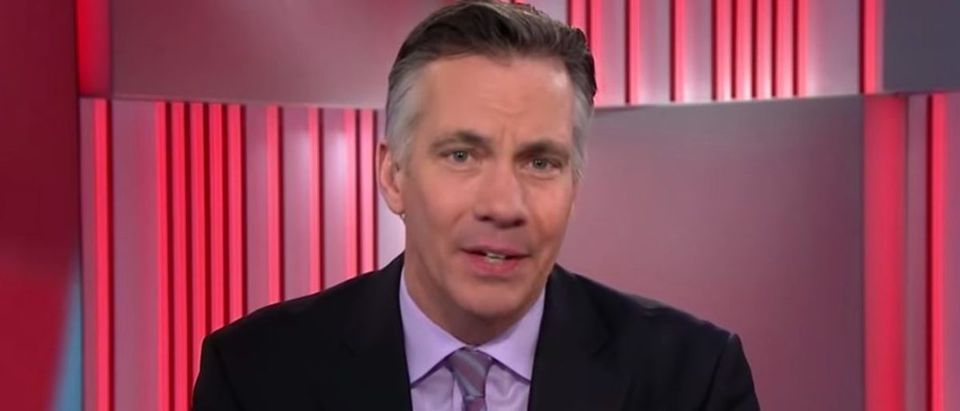- The Justice Department inspector general’s report undermined several years of reporting from journalists who defended the Steele dossier and the FBI’s handling of the infamous report.
- CNN’s Jim Sciutto was at the forefront in defending the dossier, and the bureau.
- In numerous segments since early 2017, Sciutto insisted that parts of the dossier had been corroborated, and that the FBI would never have used the document to wiretap Carter Page.
- The DOJ watchdog detailed 17 “significant” errors in the FBI’s handling of the dossier.
Perhaps more than any other journalist, CNN’s Jim Sciutto has championed the Steele dossier, asserting in news articles and on-air segments that the FBI had verified central parts of the salacious document, and that the bureau would have corroborated the information before using it in applications for surveillance warrants against former Trump campaign adviser Carter Page.
Sciutto reported Feb. 10, 2017, that U.S. officials had “corroborated some” parts of the dossier. He insisted Dec. 26, 2017, in a broadcast that the FBI would have corroborated information in the report before using it to spy on Page.
Sciutto, a former Obama State Department official, made a similar argument Feb. 2, 2018, after it was revealed that the FBI obtained three additional surveillance warrants on Page. Sciutto said the renewals would have been granted only if the FBI had “gained valuable intelligence” from wiretapping the former Trump aide. And Jan. 7, 2019, Sciutto said it was a “fact” that the FBI had corroborated some of the dossier.
All of those claims were showed to be misleading or outright false in a Justice Department inspector general’s report released Monday.
The report said the FBI was unable to corroborate any of the information from dossier author Christopher Steele that was used in Foreign Intelligence Surveillance Act (FISA) warrants against Page. Worse yet for the FBI (and Sciutto), was the IG’s finding that the FBI withheld information that actually undermined Steele’s credibility, and that of his dossier.
The IG report laid out 17 “significant” omissions and inaccuracies in the applications, many of which involved the FBI’s handling of information from Steele. (RELATED: Watchdog Report Details ‘Significant Inaccuracies’ In FBI Surveillance Of Carter Page)
The report said the FBI never corroborated any of the dossier’s allegations about Page, including that he was part of a “well-developed conspiracy of co-operation” between the Trump campaign and Kremlin. The FBI included the unverified information in the FISA applications.
The FBI also withheld information from Steele himself characterizing one of the main sources for his dossier as a “boaster” and “embellisher.” Investigators also failed to disclose that Steele’s primary source disputed how Steele characterized information in the dossier. The source told the FBI that Steele misrepresented and embellished information attributed to him in the dossier.
The IG report also debunked the dossier’s most specific allegation of collusion: that former Trump lawyer Michael Cohen visited Prague in August 2016 to meet with Kremlin officials to discuss paying off hackers.
The IG report said the allegation was “not true.”
Michael Horowitz, the Justice Department inspector general, also undercut Sciutto’s assertion that the FISAs against Page must have yielded useful information if the FBI was able to continue surveillance. In a Senate Judiciary Committee hearing Wednesday, Horowitz pushed back on Sen. Richard Blumenthal’s confident assertion that the FISAs yielded information that justified continued surveillance against Page.
He said “I’m not sure [it’s] entirely correct” to say the warrants produced useful information for the FBI.
Sciutto and his CNN colleagues have not addressed the pervasive errors in the network’s reporting on the dossier. He did not respond to an email seeking comment.
Feb. 10, 2017
Sciutto and his colleague Evan Perez reported that “for the first time U.S. investigators say that they have corroborated some of the communications detailed in a 35-page dossier compiled by a former British intel agent.”
Dec. 26, 2017
“Officials familiar with the process say that if the application included information from the dossier it would only be after the FBI had in fact corroborated information through its own investigation as well.”
“The FBI and CIA took Steele’s research seriously enough that they kept it out of a publicly released report on Russian meddling in the election in order to not divulge which parts of the dossier they had corroborated.”
Feb. 2, 2018
“We also know that the way this process works in a FISA court … is that they do not issue warrants based solely or even principally on outside information, that there would need to be intelligence to back up this request, particularly to surveil an American.”
“This warrant was issued and renewed three times. To do that, the FBI would have to come back to the judge and say it is gaining valuable intelligence from this surveillance to justify continuing this surveillance.”
Jan 7, 2019
“The fact is … that some of the central claims, allegations in the dossier have been corroborated in the past two years.”
https://www.youtube.com/watch?v=x1Q_v42seRQ&feature=youtu.be
All content created by the Daily Caller News Foundation, an independent and nonpartisan newswire service, is available without charge to any legitimate news publisher that can provide a large audience. All republished articles must include our logo, our reporter’s byline and their DCNF affiliation. For any questions about our guidelines or partnering with us, please contact licensing@dailycallernewsfoundation.org.


